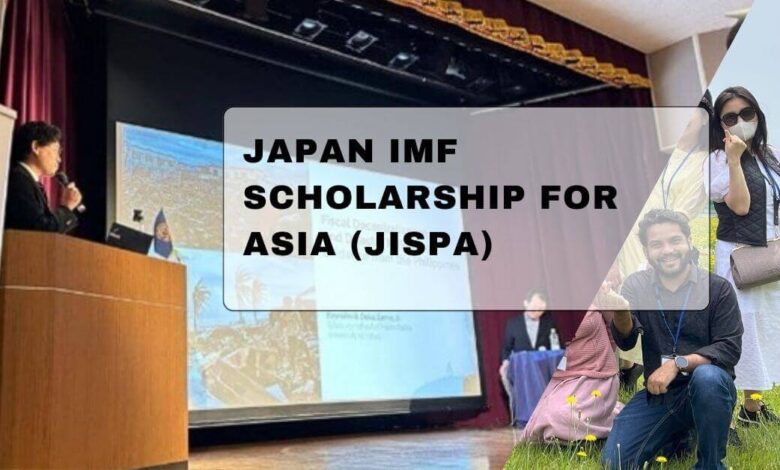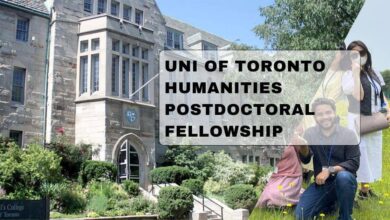Japan IMF Scholarship For Asia (JISPA) 2026

The Japan IMF Scholarship For Asia (JISPA) 2026 offers fully funded scholarships in Japan for junior government officials across Asia. Scholars can pursue Master’s and PhD programs at top universities like GRIPS, Hitotsubashi, IUJ, and the University of Tokyo, with comprehensive coverage including tuition, monthly stipend, airfare, and research expenses. This prestigious IMF Japan scholarship program combines academic excellence, leadership development, and networking opportunities with policymakers, empowering public sector professionals to shape their country’s future.
What is the JISPA Scholarship?
The JISPA scholarship 2025 / 2026 is a fully funded scholarship in Japan aimed at fostering future leaders in public service across Asia. Supported by the Japanese government and IMF, this program offers both Master’s and PhD tracks, giving scholars the freedom to pursue studies at top Japanese universities such as GRIPS, Hitotsubashi, IUJ, and the University of Tokyo.
Whether you’re interested in public policy studies in Japan or advanced research in economics, JISPA provides an unparalleled platform for learning, networking, and career growth.
JISPA Master’s and PhD Programs:
- Master’s Track: Focused programs in economics and public policy at Japan’s leading universities.
- PhD Track: Flexibility to conduct doctoral research at any leading Japanese university with full financial backing.
Both tracks emphasize academic excellence, practical policy application, and leadership development.
Who Can Apply? – Eligibility for Japan IMF Scholarship For Asia:
The JISPA scholarship is open to junior government officials in Asia who meet the following criteria:
- Nationals of participating countries in Asia (e.g., Bangladesh, India, Indonesia, Nepal, Philippines, Sri Lanka, Thailand, Vietnam).
- Employed in central banks, ministries of finance/economy, planning/development bodies, tax administrations, or related agencies.
- Bachelor’s degree for the Master’s Track or Master’s degree for the PhD Track.
- Fluency in English (TOEFL/IELTS recommended).
- Priority to applicants under 36 with at least two years of public sector experience.
For detailed guidance, check how to apply for JISPA scholarship through the official portal.
Comprehensive Benefits of the JISPA Scholarship in Japan:
The benefits of the JISPA scholarship make it a truly fully funded master’s and doctoral scholarship in Japan:
- Tuition coverage for your entire program.
- Generous monthly stipend to support living expenses.
- Round-trip airfare and travel expenses.
- Visa and medical pre-arrival support.
- Orientation, workshops, and policy dialogue sessions with IMF economists.
- Research-related costs for PhD scholars.
This financial support ensures scholars can focus entirely on academics, leadership, and public service without worrying about costs.
Life as a JISPA Scholar in Japan:
Life as a JISPA scholar in Japan goes beyond the classroom. Scholars enjoy:
- Immersive cultural experiences and field trips.
- Networking opportunities with IMF economists and policymakers.
- Workshops and seminars hosted by Japan’s Ministry of Finance, Bank of Japan, and other institutions.
- Access to a global alumni network JISPA for continued professional growth.
Imagine starting your journey in Japan, engaging in high-level discussions, and returning home equipped to drive impactful policy reforms.
Check Also: Fully Funded PhD Fellowships In Cologne Germany
Scholarships for Junior Government Officials in Asia:
JISPA is more than a scholarship; it’s a leadership and public service scholarship in Asia. It targets promising officials who aspire to influence economic and social policy in their countries. Past alumni have gone on to senior roles in central banks, ministries, and international organizations.
How to Apply for JISPA Scholarship?
- Check eligibility for Japan IMF Scholarship For Asia.
- Prepare your academic transcripts, professional references, and English proficiency scores.
- Submit the online application through the official JISPA portal.
- Applications are evaluated on academic merit, work experience, English and quantitative skills, and leadership potential.
For full details, visit: JISPA Official Application Page
Why Choose the JISPA Scholarship?
- Gain international exposure through IMF-supported academic programs in Japan.
- Build a global network of policymakers and scholars.
- Access fully funded opportunities covering tuition, stipend, and travel expenses.
- Enhance skills in public policy and economics for real-world impact.
Whether your goal is advanced research, policy leadership, or regional development, the JISPA scholarship 2025 / 2026 opens doors to transformative experiences.
Apply: https://www.imf.org/en/Countries/ResRep/OAP-Home/JISPA-Home/what-is-jispa
Visit daadscholarship.com for More Fully-funded Scholarships 2026 News.
Conclusion:
The Japan IMF Scholarship For Asia (JISPA) is a rare chance for Asian public officials to combine academic excellence, leadership development, and professional networking—all fully funded in Japan. If you aim to shape your country’s future through policy and economics, this scholarship is your stepping stone.
Frequently Asked Questions:
What is the Japan IMF Scholarship For Asia (JISPA)?
The JISPA scholarship is a fully funded scholarship in Japan for junior government officials from Asia. It supports Master’s and PhD programs in economics and public policy at top Japanese universities like GRIPS, Hitotsubashi, IUJ, and the University of Tokyo. The program is supported by the Japanese government and IMF.
What programs are offered under JISPA?
Master’s Track: Tailored programs in economics and public policy at Japan’s leading universities.
PhD Track: Research-focused programs with freedom to choose any top Japanese university. Both tracks are fully funded.What does the scholarship cover?
The JISPA scholarship benefits in Japan include:
Full tuition fees.
Generous monthly stipend.
Round-trip airfare and travel costs.
Visa and pre-arrival medical support.
Orientation, workshops, and policy dialogue sessions with IMF economists.
Research-related costs for PhD scholars.



